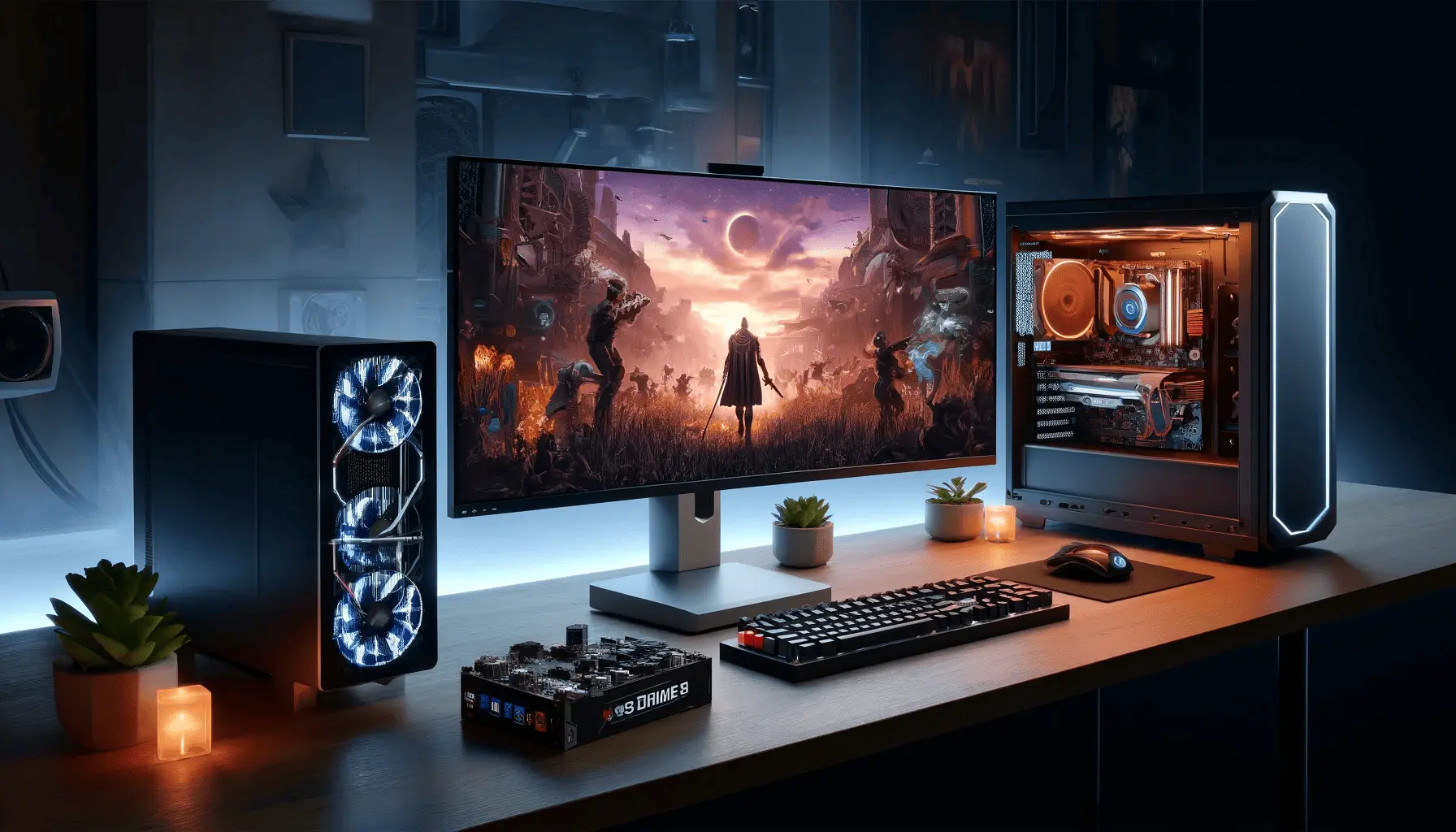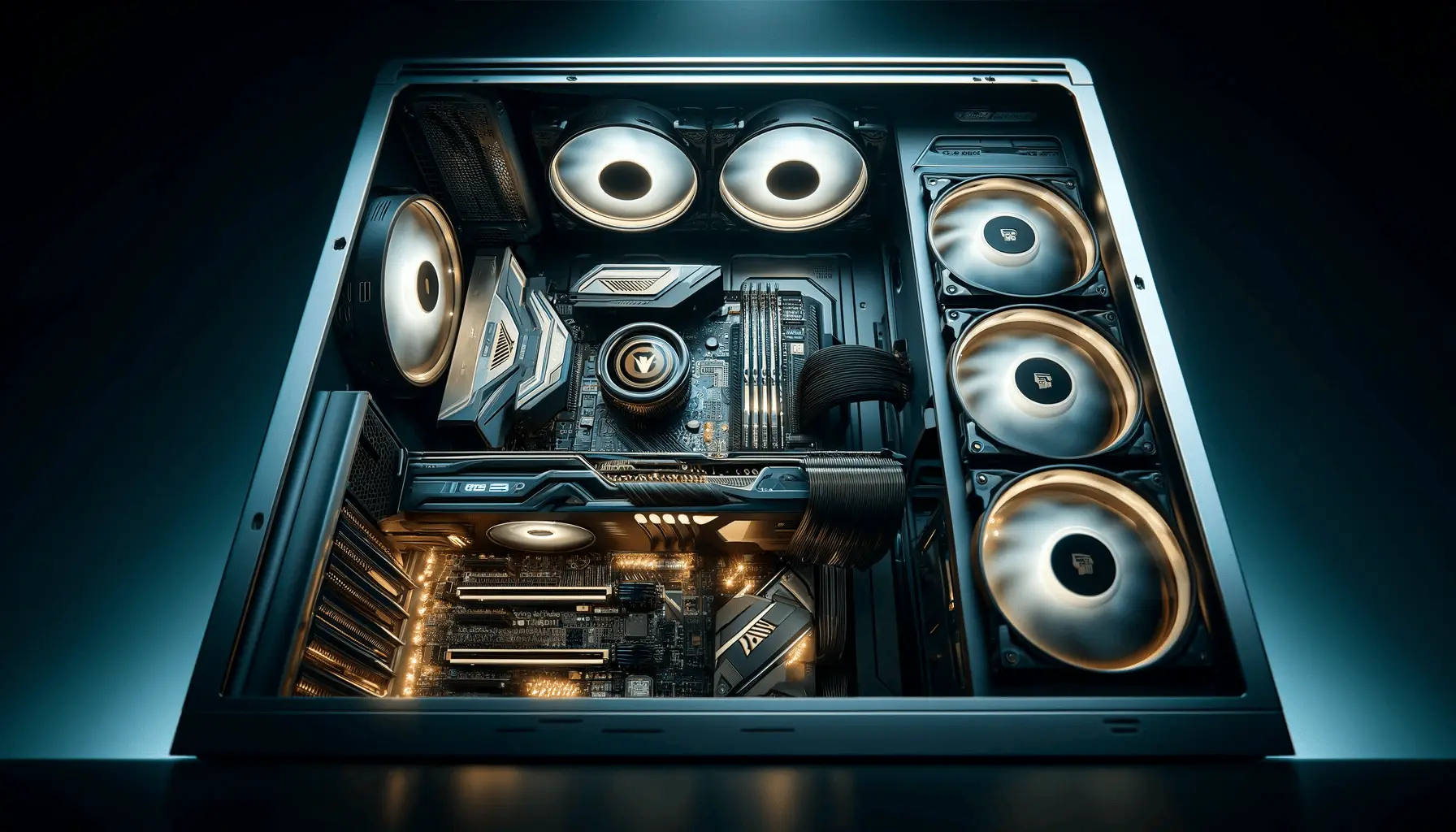In the realm of PC gaming, the quest for an optimal performance setup is endless. Whether you're maneuvering through the expansive universe of the latest RPG or holding your ground in an online FPS battle, the performance of your PC can significantly impact your gaming experience. Achieving a high-performing gaming setup is about understanding and optimizing each aspect of your system to work in harmony. Here we dive into the initial steps of optimizing your PC for high-end gaming, focusing on assessing your current hardware and planning strategic upgrades to elevate your gaming to new heights.
Assess Your Current Hardware
Understanding the starting point of your optimization journey is crucial. Begin by evaluating the core components of your PC, as these will determine the potential for improvement and the direction of your upgrades. Key components include:
Processor (CPU): Your CPU is the brain of your PC, handling computations and tasks essential for running your games. A bottleneck here can hinder performance, even with a top-tier graphics card.
Graphics Card (GPU): The GPU renders the visual elements of your game. For high-end gaming, a powerful GPU is non-negotiable, as it directly influences frame rates and overall visual quality.
Memory (RAM): Sufficient RAM is essential for smooth multitasking and gaming, especially for games with large, open worlds or detailed textures.
Storage: The type and speed of your storage solution can affect game load times and responsiveness. SSDs offer significant performance improvements over traditional HDDs.
Power Supply Unit (PSU): A reliable and sufficient PSU is vital for delivering consistent power to your components, especially important during peak performance demands.
Cooling System: Effective cooling prevents thermal throttling and ensures your components operate within optimal temperature ranges.
Use tools like CPU-Z, GPU-Z, and benchmarking software to gather detailed information about your components and their performance. This will highlight areas ripe for upgrades and optimization.
Upgrade Your Graphics Card
For many, the graphics card is the heart of a gaming PC. A high-quality GPU also enhances game visuals, providing a more immersive experience. When considering an upgrade:
Research: Look into the latest GPU releases and compare them to your current card. Websites like AnandTech and Tom's Hardware offer detailed benchmarks and comparisons.
Compatibility: Ensure the new GPU is compatible with your motherboard and that your PSU has the necessary power connectors and capacity.
Future-proofing: Consider purchasing a slightly more powerful GPU than what you currently need. This can extend the life of your gaming setup, offering better performance as games become more demanding.

Optimize Your CPU And RAM
The synergy between your CPU and GPU is pivotal for a seamless gaming experience. A high-end GPU paired with an outdated CPU can create a bottleneck, where the processor can't keep up with the graphics card, leading to underutilization of the GPU and poor performance.
CPU Upgrade: If your CPU is several generations old, consider upgrading to a more current model. Look for CPUs that offer the best balance between performance and price for gaming.
RAM Upgrade: Modern games can consume a substantial amount of RAM. If you have less than 16GB, consider upgrading to at least 16GB or 32GB if your motherboard supports it. Also, pay attention to RAM speed, as higher speeds can offer performance benefits in certain games and applications.
Elevating Your Gaming Experience: Storage, Power, And Cooling Optimization
Optimize Your Storage For Lightning-Fast Load Times
The storage solution in your gaming PC isn't just a vault for your digital collection; it's the key to swift game loads and seamless transitions within your virtual worlds. Upgrading from a traditional Hard Disk Drive (HDD) to a Solid State Drive (SSD) can dramatically reduce loading times, enhancing your gaming experience.
SSD Over HDD: Unlike HDDs, SSDs have no moving parts and offer significantly faster read and write speeds. This speed translates to quicker game loading times, faster installation of updates, and a more responsive system overall.
NVMe SSDs: For an even greater speed boost, consider NVMe SSDs. These plug directly into the motherboard and offer multiple times the throughput of traditional SATA SSDs, pushing the boundaries of what you thought possible in game load times.
When selecting an SSD, consider the size of the games you typically play and how many you wish to keep accessible at any given time. A 1TB SSD is a good starting point for most gamers, balancing cost and capacity.
Power Supply: The Unsung Hero Of PC Gaming
The Power Supply Unit (PSU) is often overlooked in the quest for gaming optimization, yet it's crucial for stability and longevity. A high-quality PSU ensures your components receive clean and consistent power, especially under heavy loads.
Wattage: Make sure your PSU can handle the total wattage demand of your components, plus a margin for future upgrades. Online power supply calculators can help you determine your system's requirements.
Efficiency: Look for a PSU with an 80 Plus certification, indicating high energy efficiency. This not only saves on your electricity bill but also generates less heat, reducing cooling demands.
Modularity: Modular PSUs allow you to use only the cables you need, reducing clutter and improving airflow within your case.

Cooling: Keeping The Heat At Bay
Effective cooling is essential for maintaining peak performance in your gaming PC. High temperatures can lead to thermal throttling, where your components deliberately slow down to prevent overheating, impacting your gaming experience.
Air vs. Liquid Cooling: Air coolers are cost-effective and sufficient for most setups, but liquid cooling systems offer superior cooling capacity and quieter operation. Consider your cooling needs based on your components and overclocking intentions.
Case Fans: Good airflow within your PC case is crucial. Ensure you have a balanced configuration of intake and exhaust fans to maintain a steady flow of cool air over your components.
Thermal Paste: Regularly replacing the thermal paste between your CPU and its cooler can improve thermal conductivity and cooling efficiency. This simple maintenance task can prevent overheating and prolong the life of your components.
Optimizing your storage, power supply, and cooling system is a significant step toward a high-end gaming setup. These components work in the background, quietly enhancing the performance and reliability of your system, allowing you to focus on what matters most: the game.
Final Touches: Software Optimization And Keeping Your Drivers Updated
After upgrading your hardware and ensuring your system operates within optimal temperature ranges, the final frontier in optimizing your PC for high-end gaming is software and driver management. These elements are crucial for ensuring your hardware communicates effectively and performs at its peak.
Operating System Optimization
Your operating system (OS) is the foundation upon which all your gaming experiences are built. Optimizing your OS can significantly impact performance, especially in gaming.
Background Processes: Regularly check for and disable unnecessary background applications that consume system resources. Task Manager in Windows offers a straightforward way to monitor and manage running processes.
Visual Effects: Adjusting for best performance in the System Properties can free up resources. This step involves minimizing animations and visual effects that are resource-intensive but not essential for gaming.
Power Settings: Ensure your PC is set to High Performance in the Power Options. This setting allows your system to utilize its components to their fullest potential, rather than conserving energy.
Driver Updates: The Lifeline Of Your Gaming PC
Drivers are essential software components that allow your operating system to communicate with your hardware. Keeping these updated is crucial for performance and security.
Graphics Drivers: GPU manufacturers frequently release driver updates, often timed with major game releases. These updates can provide significant performance enhancements and bug fixes. Tools provided by NVIDIA, AMD, and Intel can automate the detection and installation of the latest drivers.
Other Hardware Drivers: While GPU drivers are most critical for gaming, keeping your motherboard, sound card, and peripheral drivers updated is also beneficial. Manufacturer websites and dedicated software can help manage these updates.
Game-Specific Optimization
Many games offer built-in optimization tools that automatically adjust settings based on your hardware. Additionally, exploring community forums and guides can uncover game-specific tweaks that enhance performance or visual quality without sacrificing frame rates.
Software Tools For Gaming Optimization
Several third-party applications can help manage and optimize your gaming experience. Tools like MSI Afterburner allow for GPU overclocking and monitoring, while software like Razer Cortex can optimize system settings specifically for gaming sessions.
Keeping Your System Secure
Lastly, ensuring your system is secure from malware and viruses is crucial, as these can significantly impact performance. Regularly updating your antivirus software and being cautious about the sources of your downloads are essential practices for maintaining a healthy gaming PC.
Remember, the goal is to balance performance, stability, and visual fidelity to achieve the best possible gaming experience. As you apply these optimizations, you'll not only enhance your gaming sessions but also extend the lifespan and efficiency of your gaming rig. Happy gaming, and may your frames be high and your temperatures low!
Sources:
1.https://www.pcgamer.com/the-best-graphics-cards/
2.https://www.techradar.com/computing/gaming-pcs/how-to-build-the-most-powerful-gaming-pc



